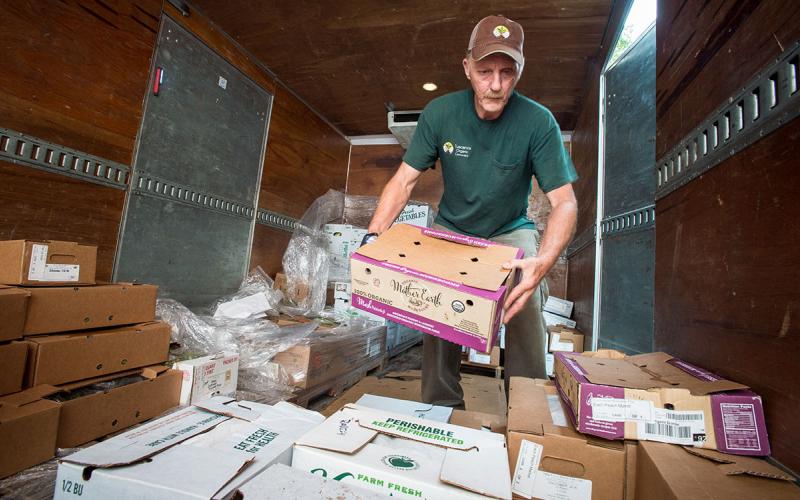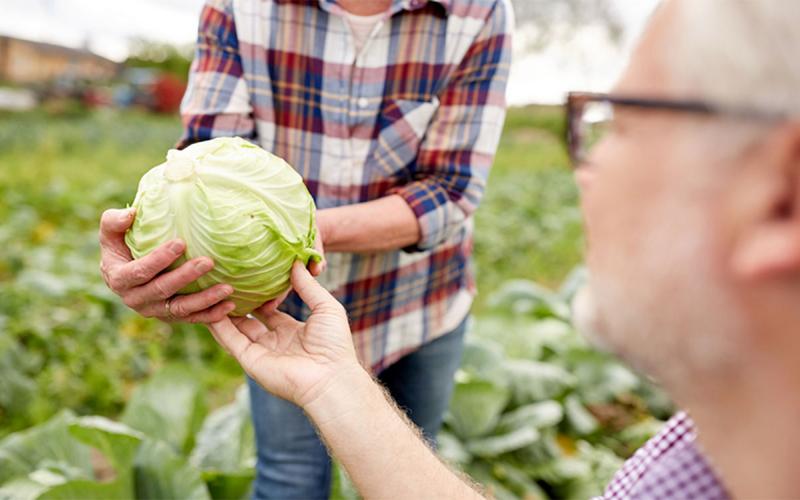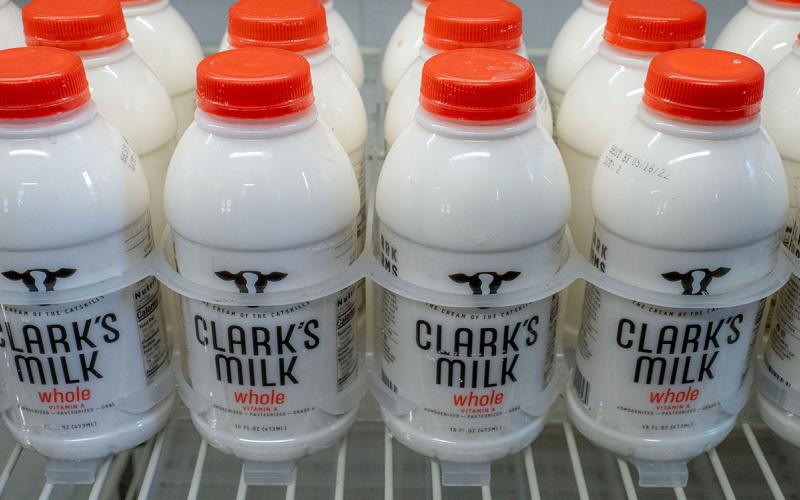Overview
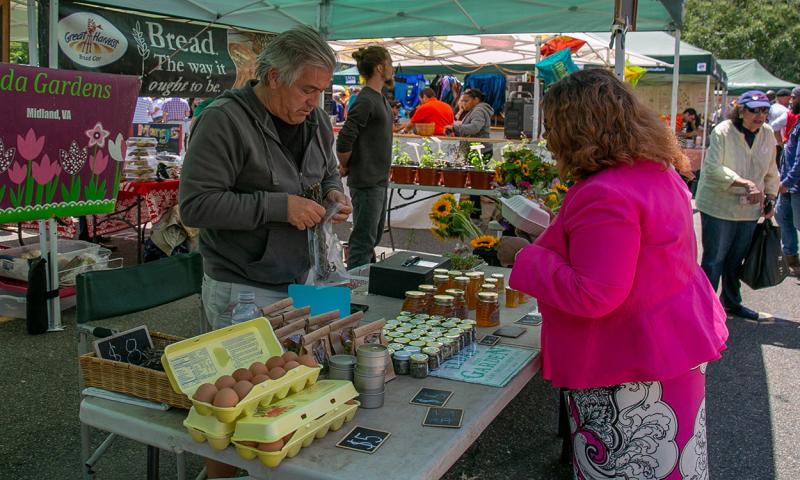
Farmers markets are growing in popularity across the United States and South Dakota. These markets provide a valuable market outlet for local farmers and allow consumers to purchase healthy local produce and other foods. To protect this key market, it is essential that the food sold at farmers markets is produced and processed according to the relevant governmental rules, regulations, and guidelines. This will help ensure that products are as safe as possible and will help ensure that farmers markets in South Dakota have product quality and safety in mind.
If you are selling products in South Dakota, the state requirements listed in this article are what you need to follow. More information on how to ensure that your food is compliant with local, state, and/or federal regulations is included in this article as well as in other SDSU Extension articles. In addition to using SDSU Extension resources, SDSU Extension encourages vendors of the farmers markets to reach out the various agencies that regulate food in the state, including the South Dakota Department of Health (abbreviated as SDDOH), South Dakota Department of Agriculture and Natural Resources (abbreviated as SDDANR), South Dakota Animal Industry Board (abbreviated as SDAIB), and South Dakota Games Fish and Parks (abbreviated as SDGFP). Vendors should also check with the market where they are selling, as their requirements may be more stringent than state governmental regulations. This also applies to all direct-to-consumer sales of food, including festivals, bazaars, craft shows, and similar events to the farmers markets.
Foods Allowed Without Licensing
According to state regulations, South Dakota farmers markets allow the following foods without licensing. Expand the following items to view examples and regulatory requirements.
Product Examples:
- Salsa, dill pickles, and dilled cauliflower.
Regulatory Requirements:
Products Examples:
- Baked Goods: cookies, breads, cakes, cinnamon rolls, muffins, scones.
- Candy: lollipops, candy canes, fudge, caramels, cotton candy, truffles, rock candy (see regulatory requirements for certain candies).
- Dried Pasta: various dried pastas.
- Dry Mixes: spices/seasoning mixes, baking mixes, powder drink mixes, home-ground flour (for example, wheat flour, corn flour), coffee mix, baking mix, granola mix.
- Grains: wheat, corn, rice, barley, oats, popcorn, cornmeal.
- Nuts: almonds, walnuts, cashews.
- Seeds: sunflower seeds, sesame seeds, chia seeds, coffee seeds
- Spices: nutmeg, cinnamon, cloves, turmeric, cumin.
Regulatory Requirements:
- Products must be labeled according to South Dakota Codified Law 34-18-37.
- Products must be reviewed and approved by a third-party processing authority according to South Dakota Codified Law 34-18-36, or the processor must complete a state-approved online food safety training.
- For candies including chocolate-covered fruits or other products, such as cream-filled chocolates or fudge, the amount of moisture can vary, so those foods should be tested for pH and water activity by the SDSU Food Safety Lab.
Product Examples:
- Cheesecake, cream-filled cupcakes or donuts, cream cheese-based frostings or fillings, cream or meringue pies, custards, pumpkin pie.
Regulatory Requirements:
- Processor must complete a state-approved online food safety training and store products at appropriate refrigerated temperatures.
- Products must be labeled according to South Dakota Codified Law 34-18-37.
Product Examples:
- Canned, shelf-stable, naturally high-acid foods.
- Canned applesauce, canned fruits.
Regulatory Requirements:
Product Examples:
- Refrigerated or frozen cookie dough, pizza dough, and pie dough.
Regulatory Requirements:
- Processor must complete a state-approved online food safety training.
- Product must be stored and sold at a temperature of 41 degrees Fahrenheit or less, or at 0 degrees Fahrenheit or less if frozen.
- Products must be labeled according to South Dakota Codified Law 34-18-37.
Product Examples:
- Home-canned fruit jams and jellies.
Regulatory Requirements:
- Pecan pie, strawberry pie.
- If the filling is determined to require temperature control based on its water activity, the processor must complete state-approved online food safety training and store product at appropriate refrigerated temperatures.
- Products must be labeled according to South Dakota Codified Law 34-18-37.
- Intact salad greens (not cut beyond normal harvesting)
- Mixed greens with only intact leaves, includes microgreens and shoots (not cut beyond normal harvesting practices).
- Must be whole and intact according to South Dakota Codified Law 34-18-34.
- If a scale is used, it must be calibrated and certified by the South Dakota Office of Weights and Measures.
- There are more requirements dependent on total dollar amount of produce sold; see our article, Food Safety Rules for Fruit & Vegetable Growers: FAQ for more information.
Product Examples:
- Fresh (or dried) uncut fruits, vegetables, or herbs (not cut beyond normal harvesting).
- Beans, apples, tomatoes, cucumbers, strawberries.
Regulatory Requirements:
- Must be whole and intact according to South Dakota Codified Law 34-18-34.
- If a scale is used, it must be calibrated and certified by the South Dakota Office of Weights and Measures.
- There are more requirements dependent on total dollar amount of produce sold; see our article, Food Safety Rules for Fruit & Vegetable Growers: FAQ for more information.
Product Examples:
- Barbeque sauces, salad dressings, hot sauces and similar foods.
Regulatory Requirements:
- Products need to be evaluated for pH and water activity by SDSU Extension or a similar agency.
- Products must be labeled according to South Dakota Codified Law 34-18-37.
Foods Allowed With Licensing
According to state regulations, South Dakota farmers markets allow the following foods with licensing. Expand the following items to view examples and regulatory requirements.
Product Examples:
- Beverages with 0.5% or more alcohol by volume.
- Beer, wine, possibly kombucha drinks.
Regulatory Requirements:
- All alcoholic beverages require a South Dakota Department of Revenue Alcohol License.
Product Examples:
- Milk, cheese, yogurt, and other products from cows, goats, or other mammals.
Regulatory Requirements:
- Products must be pasteurized and processed at a manufacturing plant that has been licensed by the South Dakota Department of Agriculture and Natural Resources.
- Note that if a vendor can provide information about vacuum-packaged cheese to show that it does not require refrigeration for safety, a food establishment license would not be required.
- Product must be labeled appropriately.
Regulatory Requirements:
- An egg dealer license and a candler/grader license must be obtained from the South Dakota Department of Agriculture and Natural Resources on an annual basis.
- Eggs must be labeled properly with producer, grade, weight of egg, expiration date (which is 30 days from date of packing), and safe handling/preparation instructions. For example, “To prevent illness from bacteria, keep refrigerated, cook eggs until firm, and cook foods containing eggs thoroughly.”
- Eggs must be sold at 45 degrees Fahrenheit or cooler.
Product Examples:
- Catfish or rough fish.
Regulatory Requirements:
- Only catfish taken in the Missouri River and its western tributaries and rough fish, may be sold.
- Fish must be processed out of a licensed commercial kitchen and stored at proper refrigerated or freezing temperatures.
- See our article, Selling Fish at a Farmer’s Market in South Dakota for more information.
Regulatory Requirements:
- South Dakota Codified Law 38-18 requires that all apiaries must be registered with the South Dakota Department of Agriculture and Natural Resources.
- The vendor must be in compliance with all apiary laws set forth by the South Dakota Department of Agriculture and Natural Resources.
- The honey must be produced by bees kept by the vendor.
- For more information, visit the SDDAR Apiary Program website.
Product Examples:
- Orange juice, apple juice.
Regulatory Requirements:
- Juice must be processed out of a licensed commercial kitchen and follow the U.S. Food and Drug Administration’s Guidance for Industry: Juice Hazard Analysis Critical Control Point Hazards guidelines.
- For more information, see our article, Selling Juice in South Dakota.
Product Examples:
- Beef, sheep, goats, deer.
Regulatory Requirements:
- Must be processed at a South Dakota state-inspected facility that has been approved by the South Dakota Animal Industry Board or by a federally inspected facility.
- The meat must be properly labeled and stored at the appropriate refrigeration or frozen temperatures.
- See our article, Regulatory Requirements for Selling Meats at Farmer’s Market for more information.
Product Examples:
- Almond nut butter, cashew nut butter, pecan nut butter.
Regulatory Requirements:
- Must be prepared in a kitchen licensed and inspected by the South Dakota Department of Health.
- Must be tested for water activity at the SDSU Food Safety Lab.
- Must be labeled according to South Dakota Codified Law 34-18-37.
Product Examples:
- Products from farms that sell less than 20,000 birds a year.
- Chickens, ducks, geese, and turkeys.
Regulatory Requirements:
- Growers selling less than 20,000 birds a year must ensure that they meet all the criteria for the Package Labeling of Poultry processed under the Poultry Products Inspection Act.
- The poultry must be processed out of a licensed commercial kitchen and stored at proper refrigerated or freezing temperatures.
- See our article, Selling Poultry at a Farmer’s Market in South Dakota, for more information.
Product Examples:
- Certain cut produce and cut herbs.
- Leafy greens (including lettuce and cabbage), tomatoes, and melons.
Regulatory Requirements:
- Processors must complete a state-approved online food safety training.
- Products must be stored and sold at a temperature of 41 degrees Fahrenheit or less.
Product Examples:
- Alfalfa sprouts, bean sprouts.
Regulatory Requirements:
- Requires South Dakota Department of Health approval.
Frequently Asked Questions
How do I ensure that I am compliant with the requirements listed above?

For regulatory guidance on common farmers market food products, contact the following agencies:
- The South Dakota Department of Health can be contacted for meat and poultry questions regarding special processes, food risk assessment, or processing out of a licensed commercial kitchen. Visit their Contact Us page to get in touch by phone or email.
- For questions related to selling meat and poultry, you can contact the South Dakota Animal Advisory Industry Board by visiting their Contact Us page. You can also contact the USDA Food Safety and Inspection Service (abbreviated as USDA FSIS) at the Des Moines District by phone at 515-727-8960 or 1-800-990-9834.
- For questions related to selling fish, you can contact the South Dakota Games, Fish and Park by visiting their Contact Us page.
- For questions related to selling dairy and eggs, you can contact your closest South Dakota Department of Agriculture and Natural Resources office.
- Curtis Braun, SDSU Extension Food Safety Field Specialist, can also provide guidance related to the food you are trying to sell.
What if I produce (and/or process) my food in South Dakota and want to sell it in a neighboring state?
If you are selling your product across state lines, you need to meet federal requirements, South Dakota regulations, as well as the retail regulations of the state in which you are selling.
- If you are selling a processed (non-meat) product, you will need to initially register your processing facility online (at no cost) with the U.S. Food and Drug Administration (abbreviated as FDA), and then re-register it every two years (October through December) of the even-numbered years (for example, 2018, 2020, 2022, and so forth) at the FDA’s Registration of Food Facilities and Other Submissions website. The FDA may then come to inspect your facility, during which they will check to see if you are meeting their current Good Manufacturing Practices Code of Federal Regulations (Title 21, Part 110) and any other applicable regulations, such as acidified foods or low-acid canned foods regulations. Such products may also need to follow the requirements of the Federal Food Safety Modernization Act’s Preventive Controls Rule, depending on the volume of product sold.
- If you are selling a meat product, your product will need to be inspected by the USDA FSIS, rather than a state meat and poultry inspection.
- If you are selling a fresh, whole product, you may be impacted by the Food Safety Modernization Act, regardless if you only selling in-state or across state lines. For more information, you can contact SDSU Extension Horticulture Specialist Rhoda Burrows.
In addition to food safety, what other regulatory requirements do I need to follow to sell at a farmers market?
- Sales Tax: Every vendor is responsible for his or her own sales tax license and sales tax payments. More information is available on the South Dakota Department of Revenue or by contacting the agency by phone at 605-773-3311.
- Scale Testing: Farmers market vendors using a scale to sell products by weight must have a licensed service company test their scales. More information is available from the South Dakota Weights and Measures website or by contacting the agency by phone at 605-773-3697.
- Filing as a Business Entity: The South Dakota Secretary of State website has the appropriate forms available online, and the agency can be contacted by phone at 605-773-4845 for additional information. Filing as a business entity may not be required depending on the type of business entity you are (for example, sole proprietorships, general partnerships, and others).
- Mobile or Temporary Food Services and Food Trucks: The South Dakota Department of Health website offers further guidance on requirements for these entities.
What are the labeling requirements for packaged food products?
There is a requirement for labeling canned goods and baked goods in South Dakota Codified Law 34-18-37. Please note that, depending on the type of product that you are selling, such as meat, poultry, eggs, and others, you may be subject to different labeling laws. For canned and baked goods, South Dakota Codified Law 34-18-37 requires the following label information:
- Name of the product.
- Name of the producer.
- Physical address of production.
- Mailing address of the producer.
- Telephone number of the producer.
- Date the product was made or processed.
- Ingredients.
- In the case of food sold in accordance with section three of this act, a directive to keep products refrigerated or frozen; and
- A disclaimer that states: “This product was not produced in a commercial kitchen. It has been home-processed in a kitchen that may also process common food allergens, such as tree nuts, peanuts, eggs, soy, wheat, milk, fish, and crustacean shellfish.”
How are these regulations enforced?
The South Dakota Department of Health is responsible for enforcing the regulations at the farmers market. Farmers market managers, extension personnel, and other related individuals should provide information on regulations and can make suggestions on how vendors can comply with regulations. However, they are not regulators or enforcers of government regulations. Farmers market managers should enforce any requirements specific to their market.
General Food Safety Steps
Vendors selling perishable foods must have a suitable thermometer with them at the market.
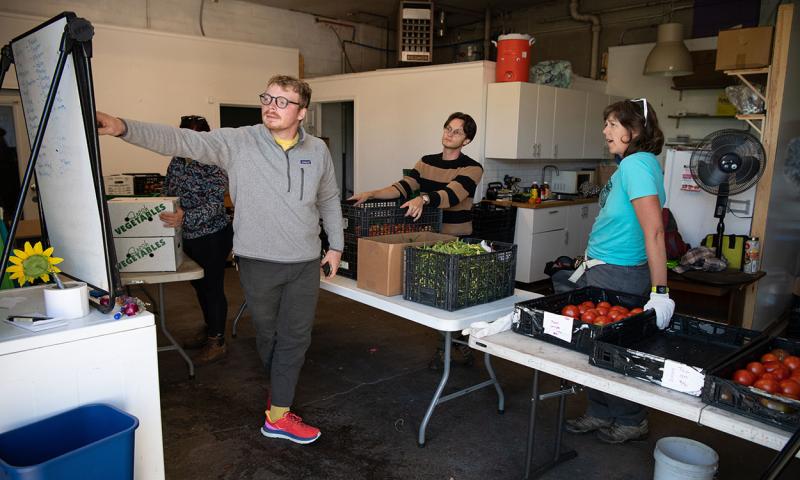
-
Hot prepared foods must be held at 140 degrees Fahrenheit or higher. This would apply for vendors with a temporary food or a mobile food license.
- Cold perishable foods must be stored at 41 degrees Fahrenheit or cooler.
- Frozen foods, such as frozen meats and ice cream, must be maintained frozen (below 0 degrees Fahrenheit is the best practice).
- Coolers, ice packs, or ice surrounding the product can be used to transport and hold cold foods. Check the temperature occasionally (about once each hour) with a stem food thermometer.
Reduce possible cross-contamination that can transfer bacteria from one food to another.
- Ensure that raw meat or poultry does not contact ready-to-eat food or fresh produce.
- If re-using bags for selling products, make sure they are clean and weren’t previously used for meat.
- Wash, rinse, and sanitize food contact surfaces, equipment, and utensils between uses (unless using one-time or disposable equipment and utensils).
Practice good personal hygiene (clean clothes, clean hands) to prevent transferring bacteria to your food.
- Shaking hands and touching money, animals, soiled vegetables or utensils can transfer bacteria to your hands.
- Wash hands as needed and do not touch prepared foods and baked goods with your bare hands (use gloves, tongs or another non-contact method).
- Hand sanitizer is not a substitute for handwashing; however, it can be used after washing your hands.
Ensure that any ingredients you use to prepare food for market are from safe sources.
- For example, use inspected meat, milk from a licensed producer, and ingredients from reputable suppliers.
Acid and Acidified Foods
Letter of Verification
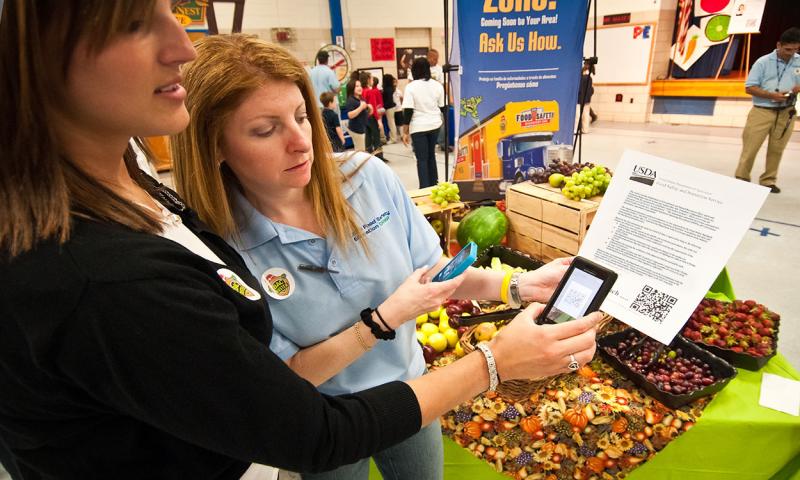
Individuals selling home-processed (canned) foods under that exemption must have the letter of verification from the third-party processing authority approving the method of processing and documentating that the pH and/or water activity standards are met (see the list below for recognized processing authorities). A copy of the letter of verification for all products must be at each location where products are sold. The letter of verification will include the following:
- Name of the food processor.
- Food item as it appears on the jar label.
- Size of the food container.
- pH or water activity results.
- Approval of the thermal processing method.
- Date letter of verification is issued.
- Signature of the food-processing authority.
Recognized Processing Authorities
South Dakota State University
- Expert: Curtis Braun, SDSU Extension Food Safety Field Specialist*
- Location: SDSU Extension Sioux Falls Regional Center, 4101 W. 38th St., Ste 103, Sioux Falls, SD 57106
- Phone: 605-782-3290
*Works with processors selling in South Dakota.
University of Nebraska-Lincoln
- Expert: Dr. Jayne Stratton, Research Professor
- Location: The Food Processing Center, 1901 N. 21st St., Lincoln, NE 68588-6206
- Phone: 402-472-2829
Kansas State University
- Expert: Dr. Fadi M. Aramouni
- Location: Kansas Value Added Foods Lab, 203 Call Hall, 1530 Mid-Campus Drive North, Manhattan, KS 66506
- Phone: 785-532-1668
Verification and Testing Costs
The cost to review and approve acid or acidified foods when performed by SDSU Extension is free and will include the following:
- Analysis and report of pH/water activity.
- Third-party processing authority, including review of processing method and letter of verification.
- In some instances, a water activity test may have to be conducted.
Selling Fresh Produce
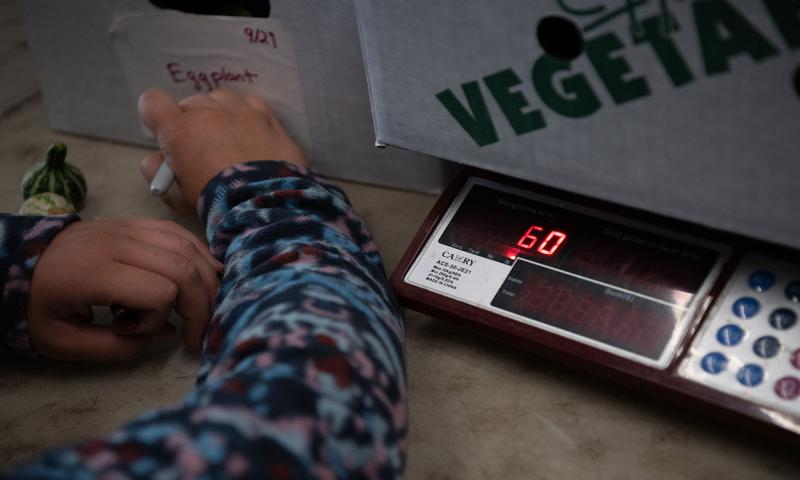
- Unprocessed whole fruits and vegetables do not require a license or licensing fees.
- Produce growers selling at markets are encouraged to know, understand and apply the principles of the Food Safety Modernization Act’s Produce Safety Rule, even if they are exempt from Food Safety Modernization Act coverage.
- For more questions and more information, you can contact SDSU Extension Horticulture Specialist Rhoda Burrows at 605-394-2236.
- Vendors using a scale to sell products by weight must have a licensed service company test their scales. Be sure to check before buying a new scale to ensure that the scale can be certified.
- Produce must be stored and displayed so that it is protected from contamination.
|
|
|
|
|
|
|
|---|---|---|---|---|---|
| Artichokes |
|
|
|||
| Asparagus |
|
|
|||
| Avocados |
|
||||
| Banans |
|
|
|||
| Beans (green, yellow, etc.) |
|
|
|||
| Brussels Sprouts (loose) |
|
||||
| Brussels Sprouts (on stalk) |
|
||||
| Cherries |
|
|
|
||
| Coconuts |
|
|
|||
| Corn on the Cob |
|
|
|||
| Dates |
|
||||
| Eggplant |
|
|
|||
| Figs |
|
||||
| Grapes |
|
||||
| Melons (cut in pieces) |
|
||||
| Mushrooms (small) |
|
|
|
||
| Mushrooms (Portobello, large) |
|
|
|||
| Okra |
|
||||
| Peas |
|
|
|||
| Peppers (bell and other varieties) |
|
|
|
||
| Pineapples |
|
|
|||
| Rhubarb |
|
|
|||
| Tomatoes (except cherry/grape) |
|
|
|
|
|
|
|
|
|
|
|---|---|---|---|---|---|
| Berries and Cherry/Grape Tomatoes |
|
|
|||
| Citrus Fruits (oranges, grapefruits, lemons, etc.) |
|
|
|
||
| Edible Bulbs (onions [spring or green], garlic, leeks, etc) |
|
|
|
|
|
| Edible Tubers (Irish potatoes, sweet potatoes, ginger, horseradish, etc.) |
|
|
|||
| Flower Vegetables (broccoli, cauliflower, brussels sprouts, etc.) |
|
|
|||
| Gourd Vegetables (cucumbers, squash, melons, etc.) |
|
|
|
||
| Leaf Vegetables (lettuce, cabbage, celery, etc.) |
|
|
|||
| Leaf Vegetables (parsley, herbs, loose greens) |
|
|
|
||
| Pitted Fruits (peaches, plums, prunes, etc.) |
|
|
|
||
| Pome Fruits (apples, pears, mangoes, etc.) |
|
|
|
||
| Root Vegetables (turnips, carrots, radishes, etc.) |
|
|
